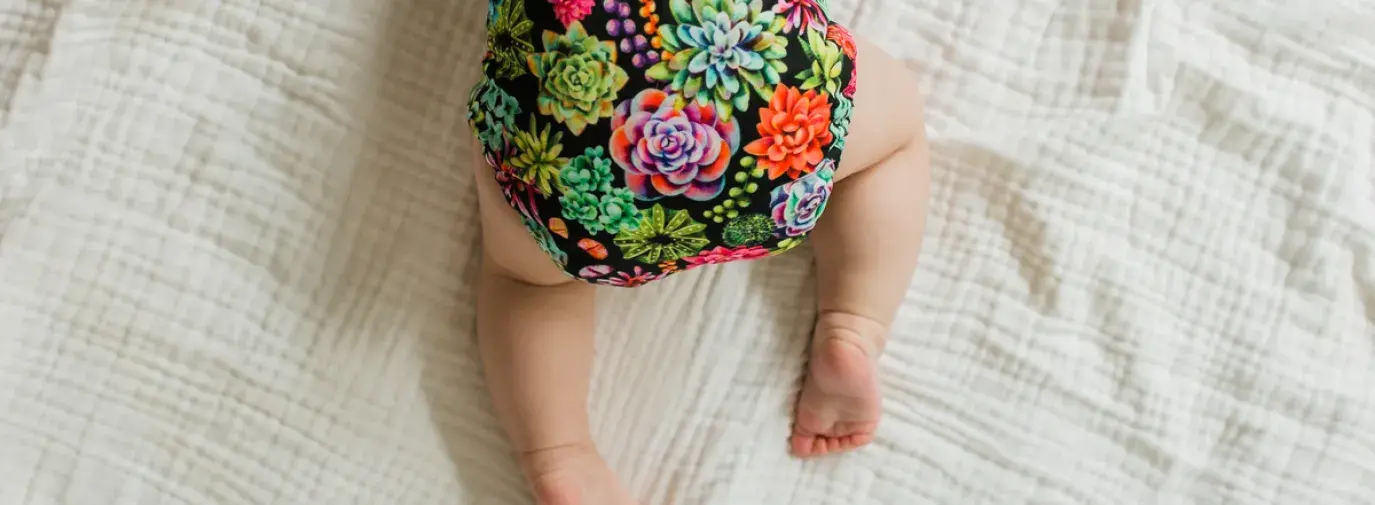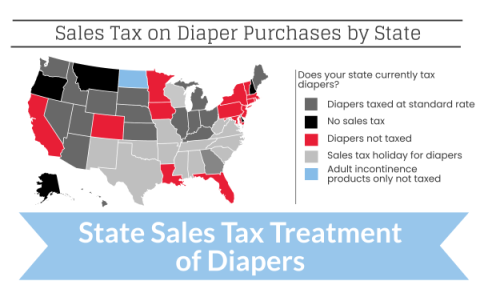
When it comes to taking care of your little one’s bum, we understand that clean might be a higher priority than “green,” but at Green America, we field many questions about the best ways to make diapering more eco-friendly. From recommended products to cleaning hacks—whether you opt for cloth or disposable—here is an all-in-one green guide for your diaper routine.
Cloth or Disposable? Dealer's Choice
To cloth diaper or not to cloth diaper—that is the question for many environmentalists, especially when newborns can go through almost 3,000 diaper changes in their first year.
The Great Diaper Debate has long made claims about which diapers are best for planet and people. Financially, cloth diapers aren’t money-saving miracles; they require higher upfront investment that will only save money after the first year, but could be compounded if re-used for another child. As for the environmental impact, from manufacturing to disposal, there appears to be a negligible difference between cloth and disposable diapers—and pros and cons to both.
Disposable diapers have that magical “be gone!” quality that everyone—from 12-year-old babysitters to sleep deprived parents—can appreciate, but the gift of their one-time use is also materially wasteful as they’re carted away to landfills. Organic cotton cloth diapers, on the other hand, can be cleaned and re-used to cut down on material waste, but in the process demand higher water and electricity use at home, plus extra care.
Therefore, it all comes down to personal preference, but remember, “It doesn’t have to be an all or nothing thing,” says Dana Christianson, director of membership marketing and operations and one of the many green parents here at Green America. “People feel like, ‘I have to do this or not do this.’ No! You can make it up as you go.”
Cloth diapers with disposable liners, disposable diapers just for nighttime, travel, or daycare—no matter what you choose or how you might mix and match, the choice is yours.
Diapering Eco-Tips
When it comes to living green, what works for one parent might not work for another. That’s why, regardless of diaper type, there are always ways to make your routine more eco-friendly.
Look at the ingredients: When buying any baby products, a general rule of thumb is to look at the components—the more pronounceable they are, the better. Manufacturers are not required to publicly disclose their diaper “ingredients”—an option that big brands like Pampers and Huggies take advantage of—so trust in brands that prioritize transparency. Naty by Nature Babycare and Honest {GBN} diapers are good places to start with their fully disclosed plant-based materials.
Think natural: From foods to mattress pads, choosing organic will ensure fewer pesticides for planet and baby. Artificial fragrances are high in toxicity, and Environmental Working Group warns that “fragrance” should simply be read as “hidden chemicals.” According to the Children’s Environmental Health Network, many synthetic chemicals in fragrances are petroleum-based and include carcinogens and phthalates, which are endocrine disruptors, so choose products that are fragrance free or use essential oils.
Proper care: “The biggest misconception we combat is that cloth diapers are hard to care for,” says Kathleen Merrill, director of operations for Thirsties, Inc., a USA-made cloth diaper company. “Once you get your wash routine down, it’s really a slight addition to your normal laundry.”
Care for cotton diapers is easiest with newborns, when soiled diapers can be placed directly into the wash. However, when babies start eating solid foods at six months, the solid waste will add just a few additional steps to your regular laundry. To cut down on your environmental impact, line drying, and investing in high-efficiency appliances.
Proper disposal: While products like Diaper Genies might be helpful, sealing dirty diapers in multiple layers of plastic supports fossil fuel use and slows decomposition, so try to limit your trash bags. Biodegradable diapers are a great way to mitigate waste, but remember that throwing compostable diapers in the regular trash defeats their purpose. Not all community composting programs are equipped to properly process diapers, but search online for diaper composting programs near you. Also, avoid flushable wipes as they do not break down in sewage systems. Try reusable cotton wipes for cleaning up #1 messes.
Look for ways to save energy: If you use diaper warmers, noise machines, or other products that require electricity, unplug them when not in use.
From products to habits, there are many ways to make your diapering routine more eco-friendly, so choose what works for you and your little one.

Have You Heard of the Diaper Tax?
One in three US families experience diaper need, and as of August 2022, 29 states charge sales tax on diapers, ranging from 1.5% in Virginia to 7% in Indiana, Mississippi, and Tennessee. But with additional city and county taxes, diapers can be taxed as high as 11%, as they are in Oklahoma.
“We know that sales taxes are regressive and disproportionately harm low-wage families,” says Joanne Samuel Goldblum, CEO and Founder of the National Diaper Bank Network (NDBN). “In order to thrive, families need a sufficient supply of diapers to keep children healthy and to enable parents to go to work and school.”
According to the NDBN, the average child requires around 50 diaper changes per week, and families that cannot sufficiently afford diapers face related challenges, like not being accepted to daycares and facing potential health risks, like hepatitis A, viral meningitis, and bacterial diarrhea.
“Sales taxes on these material basic necessities, whether disposable or cloth diapers, makes it harder on families to purchase the essential items they require,” says Goldblum. Reducing or eliminating state diaper taxes will make these basic necessities more affordable and help families avoid unnecessary challenges.
How can I make diaper access more equitable?
Reach out to your local legislature to lower or eliminate your state diaper tax, and advocate for diaper vouchers and distribution within your own community.
Donate money to organizations like Baby2Baby that support families living in poverty by providing diapers, clothing, and other essentials.
Donate supplies to diaper banks, locations for which can be found through NDBN.
Volunteer your time and host a diaper drive to not only help families in need but educate those in your community about the impact of the diaper tax.







